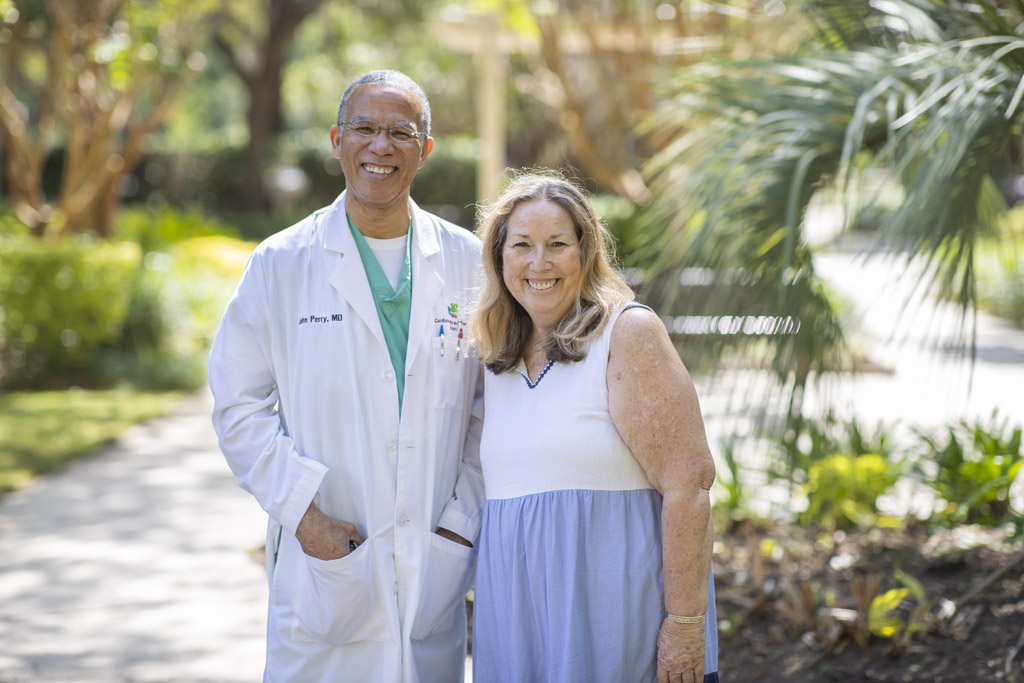While Hilton Head Hospital is recognized for a variety of achievements, the cardiovascular and thoracic surgery department is now stronger than ever with the addition of Dr. John W. Perry, who joined the Hilton Head Regional Physician Network (HHRPN) in December 2022 at Cardiovascular & Thoracic Surgery Associates.
Perry’s arrival underscores the continued efforts to provide the surrounding communities of Hilton Head with long-term cardiothoracic care.
Board-certified in thoracic and cardiac surgery, Perry has more than 20 years of clinical experience. Prior to joining HHRPN, he practiced at Mercy Cardiovascular Institute in Canton, Ohio. Prior to that, he practiced at South Carolina Cardiovascular Surgery in Florence.

Dr. John W. Perry and Deb Hall
“Dr. Perry brings a diverse skill set of contemporary cardiac surgery techniques, as well as an incredible passion to care for his patients, to the Hilton Head Regional Physician Network,” said Jennifer Wilson, acting CEO of Physician Operations for Tenet Physician Resources, South Carolina. “With the addition of Dr. Perry, residents of Hilton Head and the surrounding communities are able to receive exemplary cardiothoracic care close to home without the added stress of travel.”
One such resident is Deb Hall, 69. For more than 25 years, Hall has worked as a mental health therapist. At 62, she earned her doctorate in psychology and entered a self-proclaimed “second act” – treating children at the Therapy Group of Moss Creek.
“It’s a fairly stressful job,” she said, “and I’ve always been physically active – playing golf, swimming, walking the beach, playing with my grandchildren – to not only help me work out the stress but also to stave off any potential heart problems.”
Hall has a somber family history of heart disease. Her grandfather died at age 42, her uncle at 47, her son at 30, and her brother at 66. While her father lived longer, he underwent open heart surgery. As a result, she has been extremely proactive in her approach to health exercise. And yet, it wasn’t enough to overcome genetics.
“I wear a Fitbit activity tracker and it was telling me I was going into A-fib (atrial fibrillation),” Hall said. “I called my primary care physician and told him. He advised me that the next time it happened to go to the emergency room and see what they find, so I did.”
Initially, nothing showed up as abnormal, but to be safe, Hall followed up with a heart doctor. After running a series of tests and a performing a heart catheterization, they found 100% blockage in her main artery and recommended open heart surgery. She then connected with Dr. Perry, who scheduled surgery for the next week.
“In a week’s time, I went from a little murmur in my heart to open heart surgery,” Hall said. “I thought I was going to lose my mind.”
But she didn’t.
In fact, according to Perry, due to her proactive approach and her knowledge of family history, she experienced a best-case scenario and now she’s back to exercising, playing with grandchildren, and working.
“No one is happy when they find out they have heart disease, but Mrs. Hall’s awareness gave her a huge advantage,” Perry said. “With different choices, her disease may have showed up in her 30s or 40s, yet she didn’t experience anything until almost 70 years old.”
That awareness, according to Perry, includes the five big risk factors: genetics, smoking, high blood pressure, diabetes, and high cholesterol.
“Once you have two or three of those risk factors, you must be fully attentive and proactive, otherwise your future is bleak,” Perry said. “I’ve had patients who have lived a clean life, yet they present symptoms and are disappointed, of course, when they must have surgery. But with a different lifestyle, they may have presented symptoms 15 years earlier or more.”
Perry uses a plumbing analogy, explaining the longer the pipes are flowing, the more likely for obstruction to accumulate, with some more susceptible than others. As humans age, they will experience blockages, yet lifestyle choices can delay problems by a decade or more.
He encourages anyone with two or three of the five big risk factors to immediately become proactive, as it’s never too late. Obviously, smokers should stop smoking, and those with high blood pressure, high cholesterol, and diabetes can receive medications and dietary control to alleviate symptoms.
“There is not a lot you can do about your family history,” Perry said. “If your family member with heart disease presents at a young age (40s or 50s), we call that ‘premature coronary artery occlusive disease,’ and all the other four risk factors need to be attended to aggressively.”
Perry also stresses that especially in women – such as Hall’s case – symptoms may be atypical, like nausea, vomiting, or burning in the chest. It isn’t always necessarily the classic “elephant sitting on your chest” type of pressure. And, like Hall, it’s possible nothing will show up in the ER. He says to ask yourself if you can do as much as you are used to doing without fatigue, without having to rest more frequently.
“Another aspect to consider is that the pain or discomfort can radiate to the jaw, to either arm, or to the shoulders,” Perry said. “Many people mistakenly attribute that to some kind of joint problem or issue rotator cuff tears or something else. But if you have any of those risk factors, especially premature coronary artery occlusive disease in the family, you must take those symptoms very seriously. At least get some peace of mind that there’s nothing going on. See your doctor and have them refer you to a cardiologist.”
In addition to performing surgeries to treat a variety of cardiothoracic conditions, some of Perry’s special interests include complex aortic reconstructions, aortic and mitral valve surgery, treatment for venous disease, and minimally invasive techniques for cardiac and thoracic surgery.
He is particularly excited about the advancements of minimally invasive and less-invasive surgeries that can help achieve the same goals as more traditional surgeries but with faster recovery times and less emotional and physical trauma to the patient. With the aim of achieving the best outcome for each patient, he treats each one as if they were a family member and works with the entire hospital team to keep the patient at the center of the care circle.
“Although I’ve done this for 22 years, this is often a patient’s first encounter of cardiac surgery, so I always remember that and approach every case as if it is my first,” Perry said.
Success in surgical outcomes makes Perry most proud. He aims to return patients to their families, their jobs, and their daily routines – as in Hall’s case – with as few repercussions as possible.
“My goal is that they never have to return to me again,” Perry said.
To learn more or schedule an appointment with a cardiologist, visit HiltonHeadRegional.com.
hile Hilton Head Hospital is recognized for a variety of achievements, the cardiovascular and thoracic surgery department is now stronger than ever with the addition of Dr. John W. Perry, who joined the Hilton Head Regional Physician Network (HHRPN) in December 2022 at Cardiovascular & Thoracic Surgery Associates.
Perry’s arrival underscores the continued efforts to provide the surrounding communities of Hilton Head with long-term cardiothoracic care.
Board-certified in thoracic and cardiac surgery, Perry has more than 20 years of clinical experience. Prior to joining HHRPN, he practiced at Mercy Cardiovascular Institute in Canton, Ohio. Prior to that, he practiced at South Carolina Cardiovascular Surgery in Florence.
“Dr. Perry brings a diverse skill set of contemporary cardiac surgery techniques, as well as an incredible passion to care for his patients, to the Hilton Head Regional Physician Network,” said Jennifer Wilson, acting CEO of Physician Operations for Tenet Physician Resources, South Carolina. “With the addition of Dr. Perry, residents of Hilton Head and the surrounding communities are able to receive exemplary cardiothoracic care close to home without the added stress of travel.”
One such resident is Deb Hall, 69. For more than 25 years, Hall has worked as a mental health therapist. At 62, she earned her doctorate in psychology and entered a self-proclaimed “second act” – treating children at the Therapy Group of Moss Creek.
“It’s a fairly stressful job,” she said, “and I’ve always been physically active – playing golf, swimming, walking the beach, playing with my grandchildren – to not only help me work out the stress but also to stave off any potential heart problems.”
Hall has a somber family history of heart disease. Her grandfather died at age 42, her uncle at 47, her son at 30, and her brother at 66. While her father lived longer, he underwent open heart surgery. As a result, she has been extremely proactive in her approach to health exercise. And yet, it wasn’t enough to overcome genetics.
“I wear a Fitbit activity tracker and it was telling me I was going into A-fib (atrial fibrillation),” Hall said. “I called my primary care physician and told him. He advised me that the next time it happened to go to the emergency room and see what they find, so I did.”
Initially, nothing showed up as abnormal, but to be safe, Hall followed up with a heart doctor. After running a series of tests and a performing a heart catheterization, they found 100% blockage in her main artery and recommended open heart surgery. She then connected with Dr. Perry, who scheduled surgery for the next week.
“In a week’s time, I went from a little murmur in my heart to open heart surgery,” Hall said. “I thought I was going to lose my mind.”
But she didn’t.
In fact, according to Perry, due to her proactive approach and her knowledge of family history, she experienced a best-case scenario and now she’s back to exercising, playing with grandchildren, and working.
“No one is happy when they find out they have heart disease, but Mrs. Hall’s awareness gave her a huge advantage,” Perry said. “With different choices, her disease may have showed up in her 30s or 40s, yet she didn’t experience anything until almost 70 years old.”
That awareness, according to Perry, includes the five big risk factors: genetics, smoking, high blood pressure, diabetes, and high cholesterol.
“Once you have two or three of those risk factors, you must be fully attentive and proactive, otherwise your future is bleak,” Perry said. “I’ve had patients who have lived a clean life, yet they present symptoms and are disappointed, of course, when they must have surgery. But with a different lifestyle, they may have presented symptoms 15 years earlier or more.”
Perry uses a plumbing analogy, explaining the longer the pipes are flowing, the more likely for obstruction to accumulate, with some more susceptible than others. As humans age, they will experience blockages, yet lifestyle choices can delay problems by a decade or more.
He encourages anyone with two or three of the five big risk factors to immediately become proactive, as it’s never too late. Obviously, smokers should stop smoking, and those with high blood pressure, high cholesterol, and diabetes can receive medications and dietary control to alleviate symptoms.
“There is not a lot you can do about your family history,” Perry said. “If your family member with heart disease presents at a young age (40s or 50s), we call that ‘premature coronary artery occlusive disease,’ and all the other four risk factors need to be attended to aggressively.”
Perry also stresses that especially in women – such as Hall’s case – symptoms may be atypical, like nausea, vomiting, or burning in the chest. It isn’t always necessarily the classic “elephant sitting on your chest” type of pressure. And, like Hall, it’s possible nothing will show up in the ER. He says to ask yourself if you can do as much as you are used to doing without fatigue, without having to rest more frequently.
“Another aspect to consider is that the pain or discomfort can radiate to the jaw, to either arm, or to the shoulders,” Perry said. “Many people mistakenly attribute that to some kind of joint problem or issue rotator cuff tears or something else. But if you have any of those risk factors, especially premature coronary artery occlusive disease in the family, you must take those symptoms very seriously. At least get some peace of mind that there’s nothing going on. See your doctor and have them refer you to a cardiologist.”
In addition to performing surgeries to treat a variety of cardiothoracic conditions, some of Perry’s special interests include complex aortic reconstructions, aortic and mitral valve surgery, treatment for venous disease, and minimally invasive techniques for cardiac and thoracic surgery.
He is particularly excited about the advancements of minimally invasive and less-invasive surgeries that can help achieve the same goals as more traditional surgeries but with faster recovery times and less emotional and physical trauma to the patient. With the aim of achieving the best outcome for each patient, he treats each one as if they were a family member and works with the entire hospital team to keep the patient at the center of the care circle.
“Although I’ve done this for 22 years, this is often a patient’s first encounter of cardiac surgery, so I always remember that and approach every case as if it is my first,” Perry said.
Success in surgical outcomes makes Perry most proud. He aims to return patients to their families, their jobs, and their daily routines – as in Hall’s case – with as few repercussions as possible.
“My goal is that they never have to return to me again,” Perry said.
To learn more or schedule an appointment with a cardiologist, visit HiltonHeadRegional.com.



